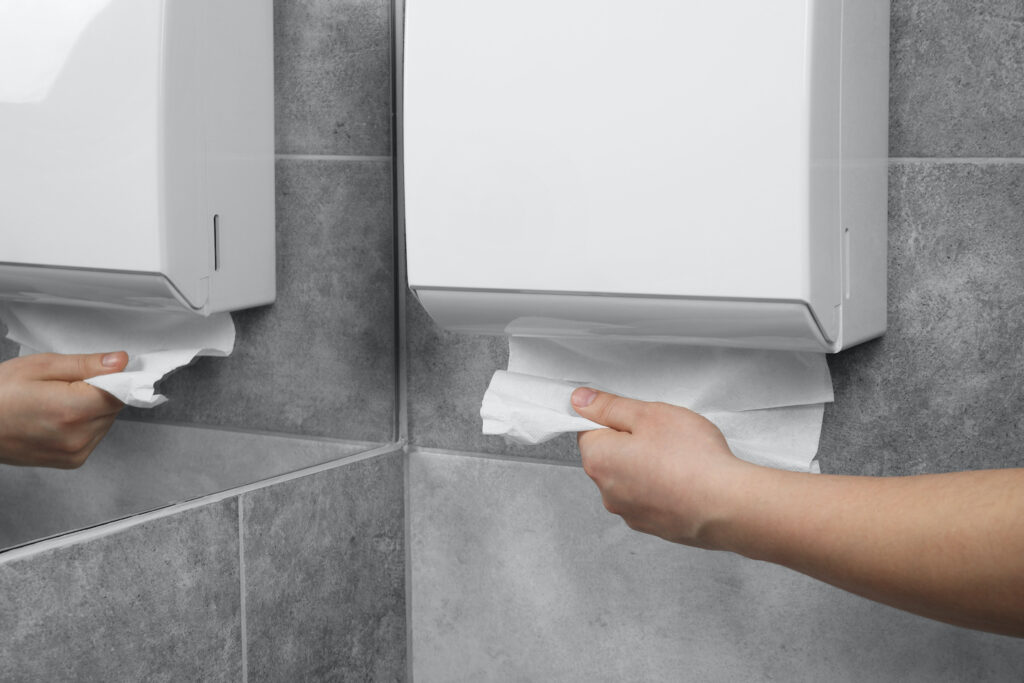
Paper Towels or Hand Dryers? Making the Best Choice for Your Facility
When designing or upgrading the restrooms in your facility, one crucial aspect that often gets overlooked is how to offer the most effective hand-drying option. Whether you manage an office, restaurant, gym, or school, the question of whether to install paper towels or hand dryers can significantly impact the cleanliness, hygiene, sustainability, and even user experience of your restrooms.
Choosing paper towels and hand dryers is not as simple as it may seem at first glance. Both options come with distinct pros and cons, and the best decision for your facility will depend on factors such as budget, environmental goals, user needs, and maintenance capabilities. In this blog, we’ll dive into the key considerations to help you make the best choice for your specific facility.
The Importance of Hand Drying in Hygiene
Before we explore the differences between paper towels and hand dryers, it’s important to emphasize why hand drying is essential in any public or private facility. Proper hand drying is a critical step in hand hygiene. Damp hands are more likely to spread bacteria and viruses than dry hands, making it crucial to provide users with a quick and effective means of drying their hands after washing.
Studies have shown that bacteria can transfer more easily from wet hands to surfaces or other people. This means that an efficient drying solution plays a pivotal role in maintaining overall cleanliness and reducing the risk of illness. But which method—paper towels or hand dryers—provides the most effective hand-drying experience?

Paper Towels: The Pros and Cons Pros of Paper Towels
- Faster Drying Time
One of the major advantages of paper towels is their speed. Users can dry their hands in as little as 10-15 seconds by simply grabbing a towel and wiping. This is particularly beneficial in high-traffic areas where long waits for hand drying can cause congestion. - Reduced Spread of Germs
Numerous studies suggest that paper towels may be more hygienic than hand dryers. By physically wiping water and bacteria off hands, paper towels help remove pathogens
more effectively. Users can also use towels to avoid touching potentially germ-laden
surfaces, like door handles.
- Low Noise Levels For facilities concerned about noise, such as hospitals, libraries, or offices, paper towels offer a silent hand-drying solution. Unlike high-speed hand dryers, which can be loud, paper towels don’t contribute to noise pollution in your building.
- No Touch
Many paper towel dispensers are designed for hands-free use, further minimizing the risk of cross-contamination. This is especially important in facilities where hygiene is a top priority, such as medical centers or food service areas.
Cons of Paper Towels
- Costly Over Time
While paper towels are relatively inexpensive on a per-unit basis, the ongoing cost of purchasing, restocking, and disposing of them can add up over time. The cost becomes even higher in facilities with heavy foot traffic, where restocking is required frequently. - Environmental Impact
The environmental footprint of paper towels is significant. Most paper towels are single-use and end up in landfills, contributing to deforestation, waste generation, and carbon emissions. Although some options are made from recycled materials, they still create waste and require constant replacement. - Increased Maintenance
Paper towels require frequent restocking and generate waste that needs to be regularly removed from trash bins. Overflowing trash cans, scattered towels on the floor, or towels clogging toilets can also increase the burden on cleaning staff.

Hand Dryers: The Pros and Cons Pros of Hand Dryers
- Eco-Friendly
Hand dryers have a smaller environmental footprint compared to paper towels, especially energy-efficient models. They reduce waste and deforestation since they don’t require the production and disposal of paper products. For facilities aiming to enhance their sustainability, hand dryers are a greener option. - Cost-Effective
Once installed, hand dryers are far more cost-effective than paper towels. While the initial investment in hand dryers may be higher, there are no ongoing costs associated with purchasing paper towels. Hand dryers also reduce waste management costs, as there’s no need to empty trash bins filled with used towels. - Low Maintenance
Hand dryers require minimal maintenance. Aside from occasional cleaning and ensuring the dryers are in working order, there’s no need for constant restocking or waste removal. This can reduce labor costs and free up janitorial staff for other important tasks.
4. Consistent Supply
With hand dryers, there’s no risk of running out of drying materials. Unlike paper towels, which require regular restocking, hand dryers provide a continuous supply of warm or cool air for users to dry their hands at any time.
Cons of Hand Dryers
- Slower Drying Time
Although modern high-speed hand dryers have improved significantly, they still typically take longer to dry hands than paper towels. Depending on the model, drying times can range from 10 to 30 seconds. This can create bottlenecks in busy restrooms, where users may become impatient waiting for their turn. - Noise Levels
Hand dryers can be quite noisy, particularly high-speed models. In certain environments, such as schools, libraries, or healthcare facilities, the loud sound of hand dryers may be disruptive. Noise-sensitive facilities should weigh this factor when deciding between drying options. - Hygiene Concerns
There has been some debate over the hygiene of hand dryers. Some studies suggest that hand dryers, especially older models, can circulate bacteria and other pathogens in the air, potentially spreading germs. However, newer models with HEPA filters address this concern by capturing airborne particles. - Electrical Costs
Although hand dryers reduce the need for paper towels, they do consume electricity. Over time, this can add to your facility’s energy costs, particularly if you have multiple dryers operating frequently in high-traffic areas.
Key Factors to Consider for Your Facility
When deciding between paper towels and hand dryers for your facility, it’s important to evaluate several key factors:
- Foot Traffic
How many people use your restrooms on a daily basis? High-traffic areas may benefit from paper towels, which offer faster drying times and reduce potential wait times. However, hand dryers can handle high traffic without the need for constant restocking. - Hygiene Priorities
If hygiene is your top concern, such as in healthcare or food service environments, paper towels may be the better choice, as they are generally considered more hygienic. However, modern hand dryers with HEPA filters can also be a sanitary option. - Sustainability Goals
If your facility has sustainability targets, hand dryers are the clear winner due to their reduced environmental impact. Many energy-efficient models are available, offering eco-friendly alternatives to paper towels.
4. Budget
Upfront and ongoing costs are crucial factors in the decision-making process. Paper towels may seem inexpensive initially, but the long-term cost of restocking and waste management can exceed the one-time installation of hand dryers. Be sure to factor in both the initial and long-term costs when making your choice.
5. Maintenance and Labor
Consider how much time your staff spends on restocking supplies, emptying trash bins, and maintaining restroom cleanliness. Hand dryers significantly reduce maintenance needs, which can be a major advantage in facilities with limited cleaning staff.
Hybrid Approach: The Best of Both Worlds?
Some facilities opt for a hybrid approach, offering both paper towels and hand dryers to meet diverse user needs. This can be particularly useful in high-traffic areas where some users prefer the speed and hygiene of paper towels, while others appreciate the eco-friendliness and low-maintenance aspects of hand dryers. By providing both options, you give users the flexibility to choose the drying method that suits them best.
Conclusion
The decision between paper towels and hand dryers ultimately depends on the unique needs of your facility. Both options come with their own set of advantages and disadvantages, so it’s essential to consider factors such as cost, hygiene, environmental impact, and user experience when making your choice.
For facilities with a strong focus on sustainability and long-term cost savings, hand dryers may be the better option. On the other hand, for environments where hygiene and speed are paramount, paper towels may be the way to go. Regardless of your choice, ensuring that users have access to an effective and sanitary hand-drying method is key to maintaining a clean and healthy restroom environment.
